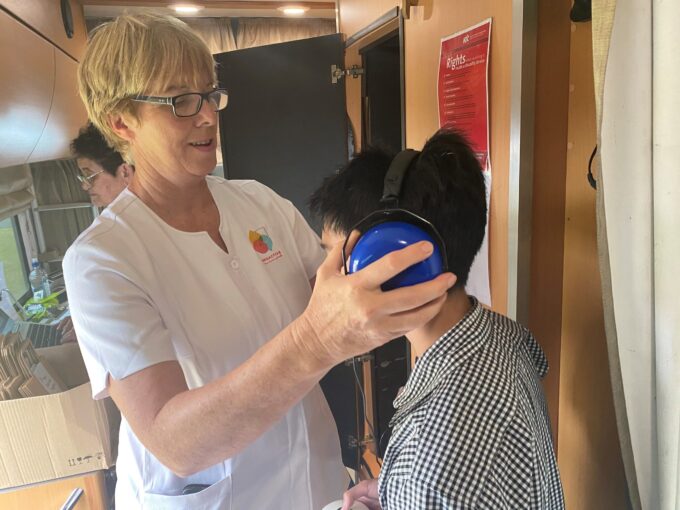
<h2><span style="font-family: arial, helvetica, sans-serif;"><strong>Hearing loss is on the rise.</strong> According to the World Health Organization, levels of hearing loss have increased by 30% since the 1990s. </span></h2>
<p><span style="font-family: arial, helvetica, sans-serif;">If these levels continue to rise at their current pace, and if we do nothing, WHO predicts that by 2050 this increase will have doubled. </span><span style="font-family: arial, helvetica, sans-serif;">Our young people will be the most impacted. Today, 1 in 5 young people have a hearing loss globally. A further one billion young people are currently at risk of preventable hearing loss. </span></p>
<p><span style="font-family: arial, helvetica, sans-serif;"><strong>The culprit? Our increasingly noisy lifestyles.</strong></span></p>
<p><span style="font-family: arial, helvetica, sans-serif;">Many young people are not aware they have done permanent damage to their hearing until it is too late. A major factor is increases in recreational noise, such as listening to devices through headphones or earbuds. </span></p>
<p><span style="font-family: arial, helvetica, sans-serif;">To find out what was happening to young peoples&#8217; hearing in New Zealand, the National Foundation for Deaf and Hard of Hearing (NFDHH) launched a pilot hearing screening programme in secondary schools across the country. Over the last two and a half years, NFDHH has screened the hearing of close to 3,000 students.</span></p>
<p><span style="font-family: arial, helvetica, sans-serif;"><strong>What we have found is alarming.</strong> Levels of youth hearing loss are skyrocketing at an unprecedented rate. The most recent data indicates that up to 26% of young people receive an abnormal screening result. Furthermore, 62% of the students referred were diagnosed with moderate to severe hearing loss. </span></p>
<p><span style="font-family: arial, helvetica, sans-serif;">While government-funded national screening provides hearing tests to newborns and preschoolers, the hearing screening NFDHH are undertaking in secondary schools shows a real need to provide hearing tests at more life stages. </span></p>
<p><span style="font-family: arial, helvetica, sans-serif;">Access to timely diagnosis, support and treatment are essential at all life stages and never is this truer than for 13–14 year-olds as they start their secondary school education. </span></p>
<p><span style="font-family: arial, helvetica, sans-serif;">Hearing loss isn’t always obvious to a parent or teacher. For many children, hearing loss can look like struggling to pay attention in class, a slower learning pace, or delayed speech development. For Sarah, mother to year 9 student Jayden, she had no idea that her son had a hearing loss.</span></p>
<p><span style="font-family: arial, helvetica, sans-serif;"><em>&#8220;I for one am so grateful for your programme. My son is in Year 9 this year and recently took part. We found out he has a loss of hearing in one ear (which we knew nothing about!). He has been to Triton and we are now waiting on a specialist for a possible hearing aid. Had your programme not have been happening we would have had no idea, he thought it was normal.&#8221; </em></span></p>
<p><span style="font-family: arial, helvetica, sans-serif;">As part of their schools&#8217; programme, NFDHH provides information to children and families on how to Make Listening Safe, ensuring young people are educated about the risks and know how to look after their fragile hearing.</span></p>
<p><img class="size-medium wp-image-20128" src="https://www.schoolnews.co.nz/wp-content/uploads/2021/07/NFDHH-2-300x225.jpg" alt="" width="300" height="225" /></p>
<p><span style="font-family: arial, helvetica, sans-serif;"><strong>What can we do right now to protect our ears?</strong></span></p>
<p><span style="font-family: arial, helvetica, sans-serif;">Here are some easy tips to keep your ears safe in the classroom and at home are:</span></p>
<ol>
<li><span style="font-family: arial, helvetica, sans-serif;">Watch the volume, keep your listening devices below half volume, (at 75 decibels and below).</span></li>
<li><span style="font-family: arial, helvetica, sans-serif;">Give your ears regular breaks.</span></li>
<li><span style="font-family: arial, helvetica, sans-serif;">Use hearing earplugs in noisy environments. </span></li>
<li><span style="font-family: arial, helvetica, sans-serif;">Never use one sound to mask another (ie listening on your headphones at max volume while vacuuming).</span></li>
<li><span style="font-family: arial, helvetica, sans-serif;">Be aware of the warning signs, such as ringing or sore ears or dulled hearing.</span></li>
<li><span style="font-family: arial, helvetica, sans-serif;">Help look after others&#8217; hearing by reminding them to turn their music down or protect their hearing in noisy environments.</span></li>
</ol>
<p><span style="font-family: arial, helvetica, sans-serif;"><em>By Hellen Robinson, Digital and Communications Manager, National Foundation for Deaf &; Hard of Hearing</em></span></p>

EXCLUSIVE: Teachers used to be paid two to three times more than minimum wage workers,…
After an “overwhelming” vote to reject the latest Government offer, secondary school teachers will begin…
Second-language learning should be compulsory, says a new report from a forum bringing together academics,…
A new entitlement aimed to improve access to learning support coordinators for schools with students…
Educators have raised questions about the Ministry of Education’s new secondary school subjects, set to…
Professional learning and development (PLD) for teachers needs to be higher impact for teachers and…
This website uses cookies.